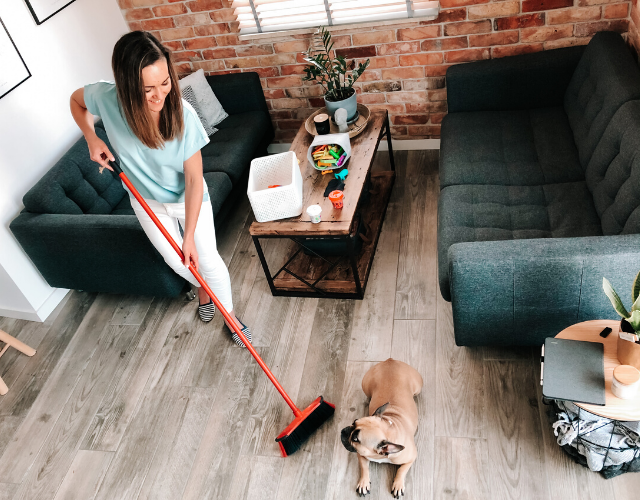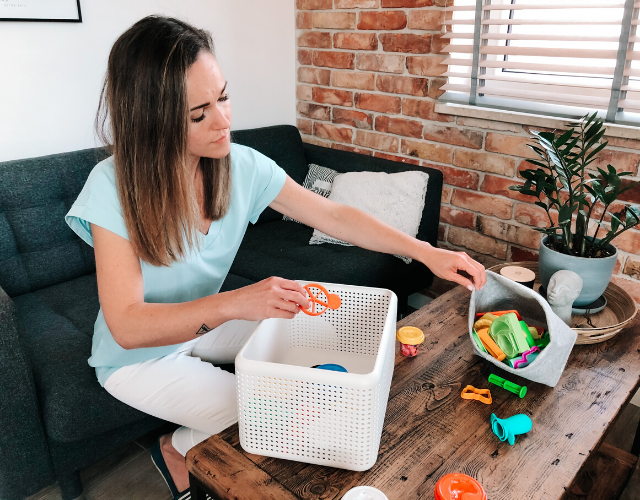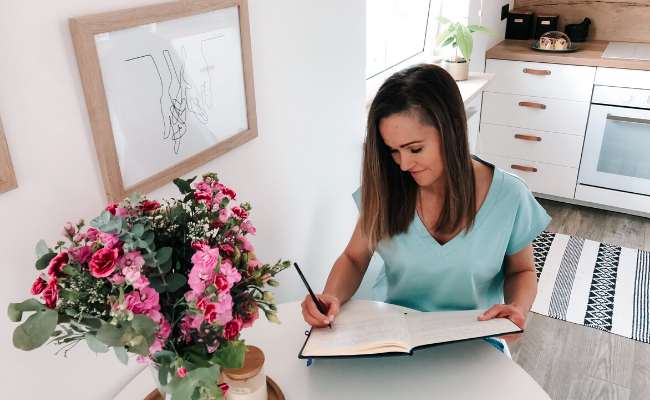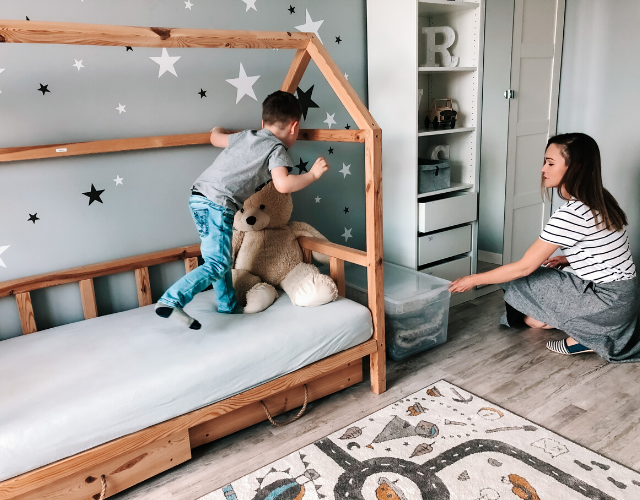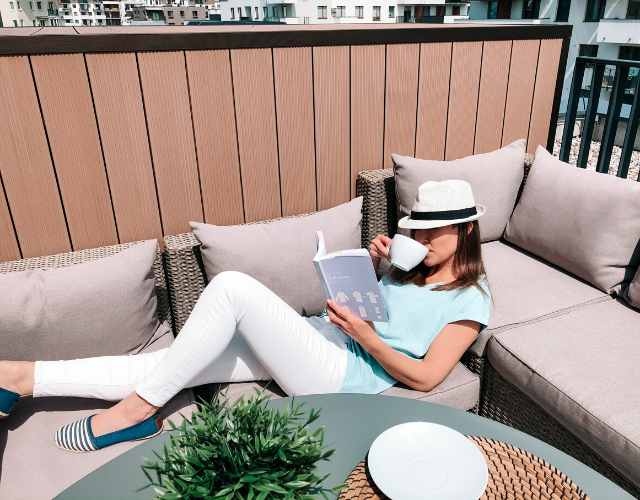Talk about your brand
Coming home after a tiring day, making yourself comfortable and relaxing, if it weren't for the mess accumulated in the last few days. You can't switch off in the chaos and at the end of the week the inevitable happens: You waste half the weekend tidying up. So that this doesn't happen again and you can finally enjoy your free time, we have 7 steps to follow to make tidying up easier.
The solution is halfway thereFirst of all, one of the most important pieces of advice: what you don't have, you shouldn't put away. The first thing to do is get rid of everything. Everything that is not needed or is defective is thrown away, sold or given away. You can also take this opportunity to sort your items into new categories and optimize your organizational system a bit.
First of all, one of the most important pieces of advice: what you don't have, you shouldn't put away. The first thing to do is get rid of everything. Everything that is not needed or is defective is thrown away, sold or given away. You can also take this opportunity to sort your items into new categories and optimize your organizational system a bit.
Every object has a home Are you constantly looking for objects, don't know where to put your things when tidying up and your wardrobes seem to be bursting at the seams? Then perhaps you haven't found the right organizational system yet. But this is the most important rule for tidying up: every object has its home. If you know where each object belongs and put it back after each use, the mess will no longer arise. Of course, putting objects back immediately is a matter of habit. However, the fact that each item has its place will also help you tidy up later.
Are you constantly looking for objects, don't know where to put your things when tidying up and your wardrobes seem to be bursting at the seams? Then perhaps you haven't found the right organizational system yet. But this is the most important rule for tidying up: every object has its home. If you know where each object belongs and put it back after each use, the mess will no longer arise. Of course, putting objects back immediately is a matter of habit. However, the fact that each item has its place will also help you tidy up later.
Not so much at onceMaybe you know it too: you take on so many things that you lose motivation in the middle of them and still can't get anything done. It's best to tidy up in small steps, so you don't have to deal with another huge mountain of tasks in your already stressful daily life. If you tidy up a little at a time, you will always have little feelings of success that will motivate you further. A good tip that reinforces this effect is to first tidy up the areas where progress is seen most quickly. For example, the floor. A clean and tidy floor immediately brings order to the room, even if there is still chaos.
Maybe you know it too: you take on so many things that you lose motivation in the middle of them and still can't get anything done. It's best to tidy up in small steps, so you don't have to deal with another huge mountain of tasks in your already stressful daily life. If you tidy up a little at a time, you will always have little feelings of success that will motivate you further. A good tip that reinforces this effect is to first tidy up the areas where progress is seen most quickly. For example, the floor. A clean and tidy floor immediately brings order to the room, even if there is still chaos.
Incorporate tidying into daily lifeTidying up your home doesn't always have to be a big cleaning job you do once a week. Even in everyday life you can get into the habit of doing things that happen unconsciously. If you put things away immediately after using them, there is no mess. What you have to force yourself to do at first will become a habit over time. If putting things away immediately doesn't work well, this trick might help: Every time you move from one room to another, take the items you want to tidy up with you. This way you divide the tidying up into small steps.
Do you need a little more time to tidy up? Then put on an interesting audiobook or podcast to make the boring activity a little more exciting: you'll see how time suddenly passes. Music is also a great mood booster that makes tidying up half the fun.
Tidying up your home doesn't always have to be a big cleaning job you do once a week. Even in everyday life you can get into the habit of doing things that happen unconsciously. If you put things away immediately after using them, there is no mess. What you have to force yourself to do at first will become a habit over time. If putting things away immediately doesn't work well, this trick might help: Every time you move from one room to another, take the items you want to tidy up with you. This way you divide the tidying up into small steps.
Do you need a little more time to tidy up? Then put on an interesting audiobook or podcast to make the boring activity a little more exciting: you'll see how time suddenly passes. Music is also a great mood booster that makes tidying up half the fun.
Write the reorganization in the diaryWe use the diary to remind ourselves of commitments. Why not remember to tidy up? Consciously dedicate time to tidying up, so that it becomes part of your daily routine. Choose a time of day when you can dedicate some time and still have enough energy: excuses will not easily stand between you and eliminating the clutter. Whether you keep ten minutes free in the morning to tidy up before leaving the house, or whether you take out the mop in the evening during the commercial break of the TV programme, is obviously up to you. The important thing is to find the moment when the obstacle to motivation for tidying up is lowest.
We use the diary to remind ourselves of commitments. Why not remember to tidy up? Consciously dedicate time to tidying up, so that it becomes part of your daily routine. Choose a time of day when you can dedicate some time and still have enough energy: excuses will not easily stand between you and eliminating the clutter. Whether you keep ten minutes free in the morning to tidy up before leaving the house, or whether you take out the mop in the evening during the commercial break of the TV programme, is obviously up to you. The important thing is to find the moment when the obstacle to motivation for tidying up is lowest.
A shared cleanliness is a shared miseryWho says you have to clean it yourself? If you live with your partner, family or roommates, you can tidy up together. And maybe you can even have a competition: whoever manages to tidy up their room the fastest receives a prize. Tidying up is even more motivating, isn't it?
Who says you have to clean it yourself? If you live with your partner, family or roommates, you can tidy up together. And maybe you can even have a competition: whoever manages to tidy up their room the fastest receives a prize. Tidying up is even more motivating, isn't it?
After work comes pleasure Honestly, for most people, tidying up is far from a pleasure, even if we feel much better in a tidy home. For this reason it is necessary to reward yourself when you have finally managed to defeat the chaos. A reward can be, for example, an activity that you particularly like or a small wish to be fulfilled. It's best to establish this before you start tidying up: a light at the end of the tunnel. And who knows, maybe with our advice cleaning will be so easy that in the end the tidiness will be a sufficient reward.
Honestly, for most people, tidying up is far from a pleasure, even if we feel much better in a tidy home. For this reason it is necessary to reward yourself when you have finally managed to defeat the chaos. A reward can be, for example, an activity that you particularly like or a small wish to be fulfilled. It's best to establish this before you start tidying up: a light at the end of the tunnel. And who knows, maybe with our advice cleaning will be so easy that in the end the tidiness will be a sufficient reward.





